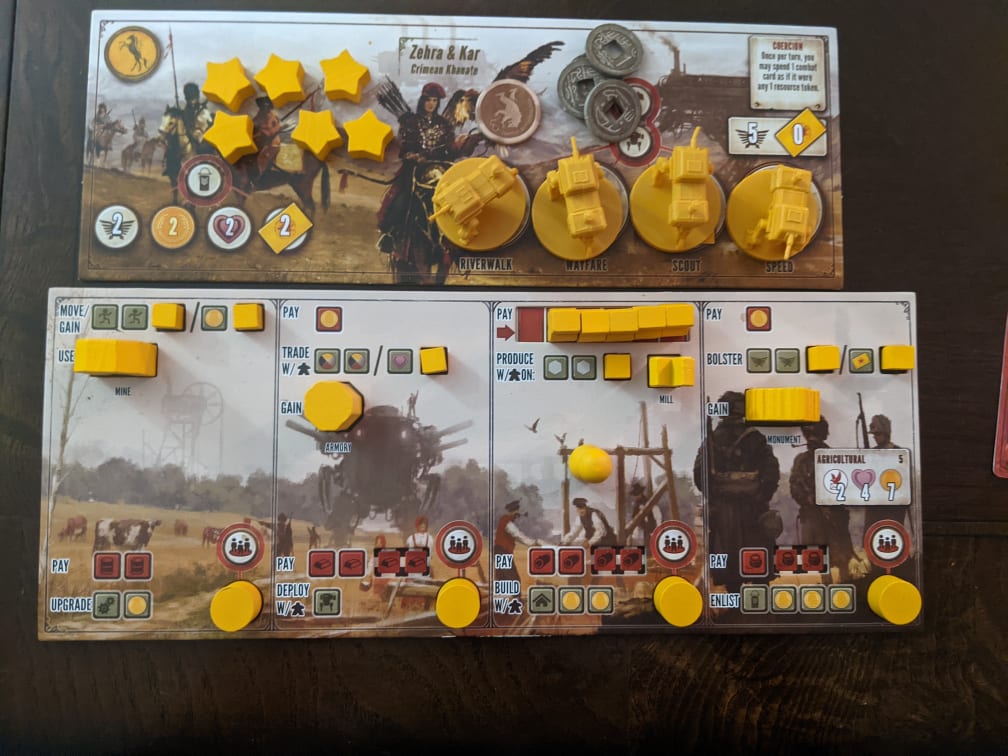Scythe Review by Ryan Miller (July 2021)
By now I shouldn’t have to tell you what a great game Scythe is. In the five years since it arrived on game shelves it has garnered countless rave reviews as a damn near perfect game and it even sits comfortably on Board Game Geek’s top twenty resting currently at spot 14. I don’t have to tell you that the game is fun, clever, and over all well put together. I don’t have to tell you the components, minis, tokens, and maps are beautiful crafted and clearly made to be durable. I don’t have to tell you any of these things.
But I’m going to tell you anyway.
The first things you’ll notice when opening the contents of Scythe is the care in creation of the moving parts of the game. The Mech minis are color coded and feature a good amount of detail. Each faction’s mech mini is distinct from the other factions’ robots and they all look gorgeous. Each faction’s leader is entirely unique and has an awesome sculpt featuring them with some great beast. Tigers, bears, and bison stand beside the heroes of the land with a certain level of majesty. A plethora of meeple/wooden tokens are crafted to make up the workers and moving parts of your faction’s board. The map is wonderful. Beyond that, the box came with a metric shit-ton of bags for clean up. If you’ve read any of my previous reviews, you’ll know how much I appreciate clean up components.

As far as gameplay goes, Scythe is much simpler to learn than it at first appears. True, the set up is daunting at first, but you’ll quickly find that through the design of the boards and the map it’s all very intuitive. There are clear markings on the map to provide homes for each of the decks and all of your wooden components have clear locations to begin.
Scythe is set in a fictional 1920s Europa where players control a faction loosely resembling European countries. Each faction has the ability to deploy eight workers and four Mechs over the course of the game. Once each player has a faction and action board, the game begins.
Playing Scythe is a joy relying on cascading actions to carry out your plans, nefarious or otherwise. On your board you have four possible initial actions to begin with and overtime you’ll also use secondary actions. The first actions are simple. Move, Produce, Trade, and Bolster. Bolster being the only one that’s not immediately obvious, it simply means raise your power, or bolster it, by two points. Of course, there are other actions attached that you could choose over those in an either/or type situation, but I find that the other 4 are most likely, especially at the beginning of the game.
As the game continues you’ll develop more workers, upgrade your board to allow secondary actions to cost less, construct buildings, and deploy Mechs. Here’s what I mean about cascading actions: anytime you unlock a Mech, build a building, or upgrade secondary actions to cost less, you unlock new abilities or allow for an action to have bonuses. Every time you get something or upgrade something, you’re offered new options and offers.

One of my favorite things about this game is that while combat is definitely a possible factor over the game, it’s not essential. It may look like a RISK style game, but it isn’t combat driven as such. You don’t win through combat, you simply push back an opponent’s forces. Additionally there are possible consequences to attacking other players. The game tracks power and popularity over two different tables. You’ll secretly spend power and combat cards to add a force total determining a winner and if there were any workers in the hex you attacked, you’ll lose a popularity point on the tracker for each. Popularity is crucial at the end of the game.
At the end of the day, you’re trying to have the most money. Since money isn’t something given from combat, you COULD go a whole game without it, but its unlikely. The last game we had featured only three or four battles.

The game looks pretty daunting, but I assure you it’s no Twilight Imperium. It’s a simple game(relatively) with beautiful components that won’t make you scramble for the rule book every twelve seconds. Easily one of the best games I’ve played in a while, but if you’ve read everybody else’s review on Scythe, you’d already know that.
-Ryan Miller – July 2021

